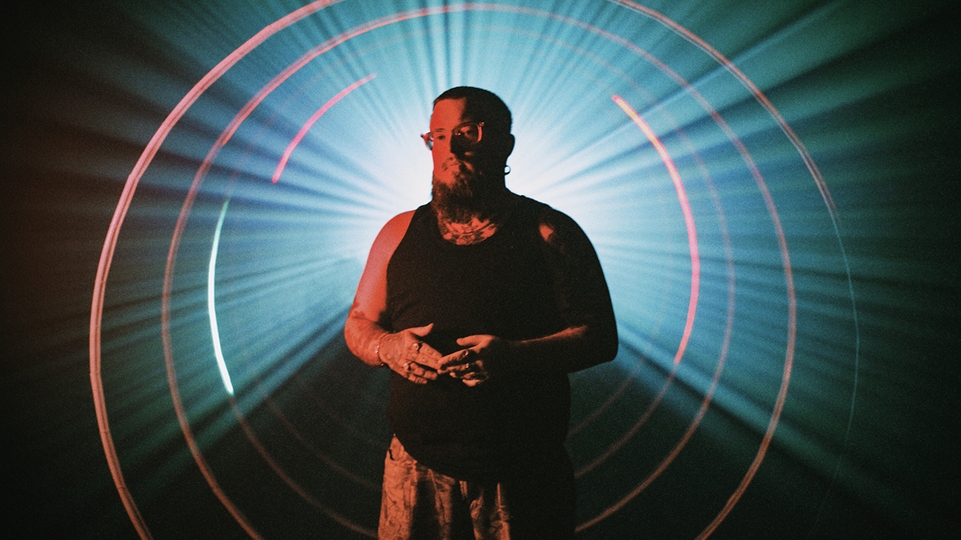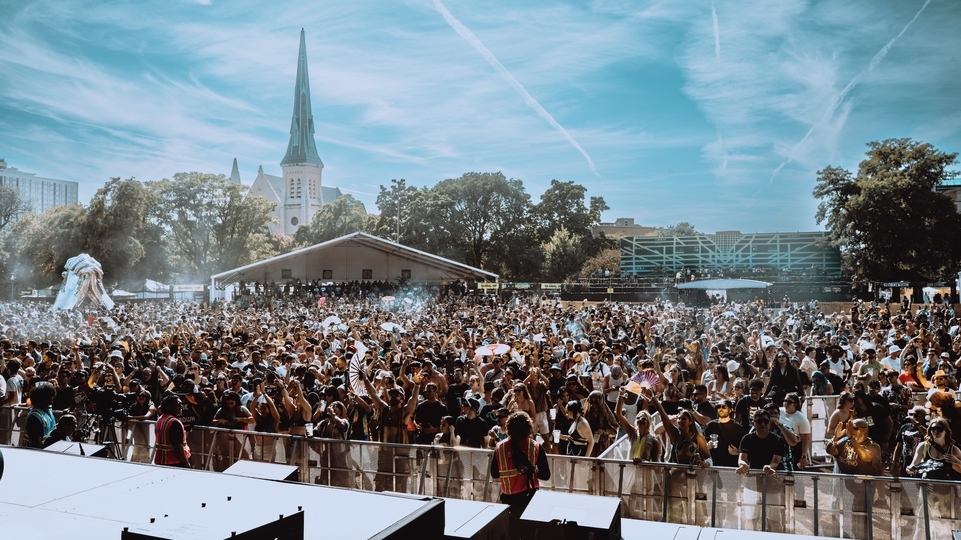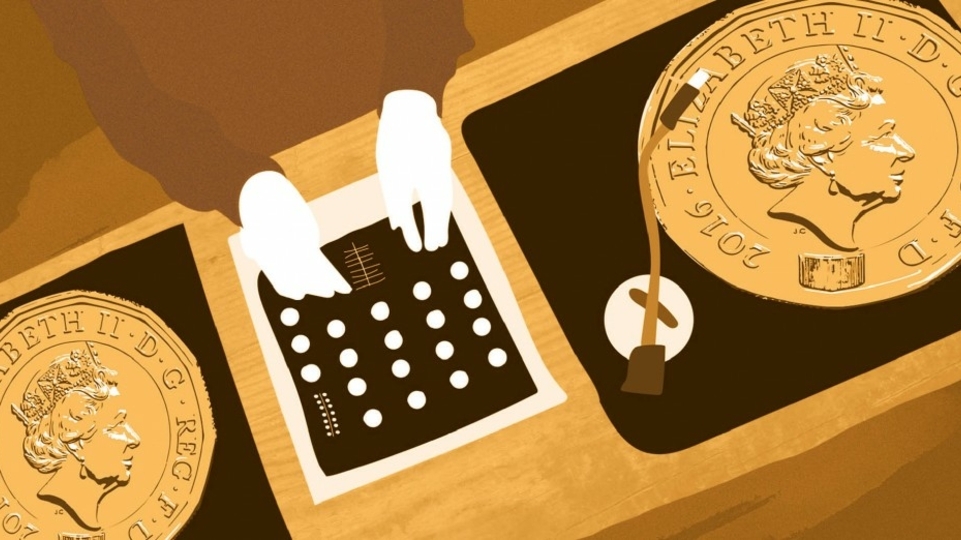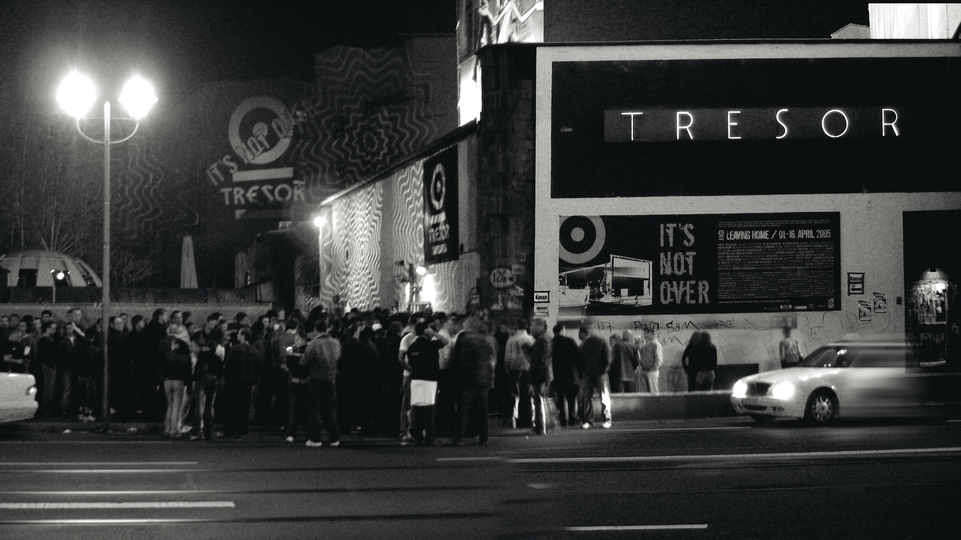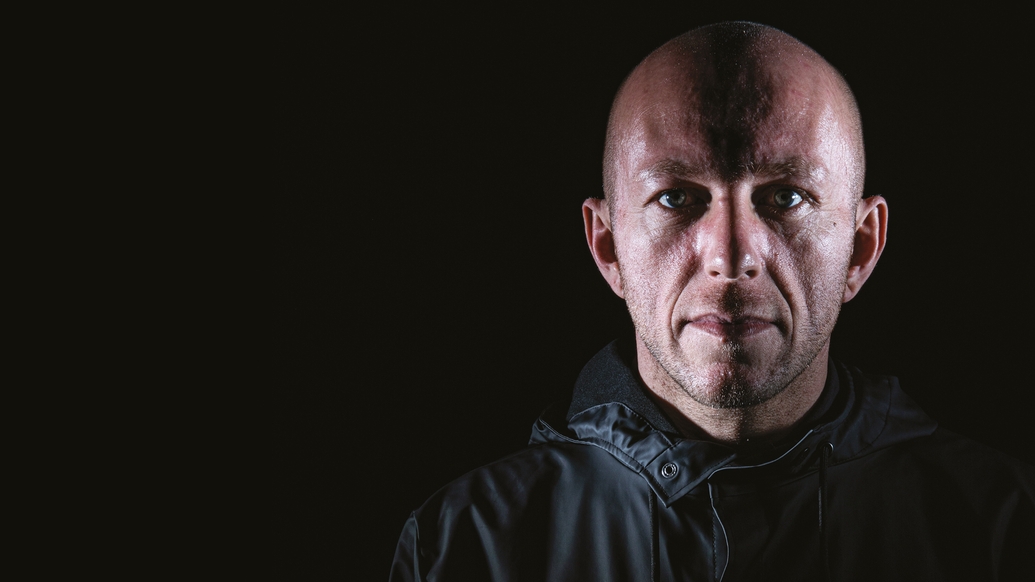
DVS1: Support. Organise. Sustain.
DVS1 is one of techno’s most well-respected DJs. He’s paid his dues, spent a couple of decades getting to where he is today, and it’s been far from an easy ride. But techno has been good to him, so now it’s time to give something back, with the launch of his new initiative S.O.S. We spoke with Zak 'DVS1' Khutoretsky about his long journey through dance music and why he thinks we now need to Support, Organise and Sustain
“I just did the closing in Berghain,” Zak Khutoretsky says. “Played a little over 11 hours, got a little rest, and now I’m here with you. There were definitely a few magical moments last night. I made a custom intro opener for myself that had a really beautiful vocal, and it set the tone and made a positive message for everyone at the beginning. I had my closing two tracks figured out; I started where I wanted, I ended where I wanted, and everything in the middle was just an adventure.”
It’s a bright autumn mid-morning when DVS1 meets us outside his MONOM space at Berlin’s Funkhaus, a sprawling repurposed GDR 1950s broadcast center in the east of the city. He’s extremely sprightly for a man who’s just done the DJ equivalent of running a marathon and had only three hours’ sleep. Dressed head to foot in black and grey, with his hair shaved to the scalp, Khutoretsky is welcoming, effusive, and animated, and after a quick Marlboro Light we head into MONOM.
The Funkhaus complex is next to the River Spree, the leaves of the maple and chestnut trees on the river bank turning various charming shades of red and brown, the water sparkling in the October sunlight. Once inside MONOM though, things couldn’t be less bucolic. MONOM is an experimental performance venue and spatial sound studio, a hall-sized, entirely monochrome room, with a sonically transparent grid instead of a floor, under which nine sub-woofers are housed. The only ‘furnishings’ are the metal lattice floor-to-ceiling speaker columns. It feels as though you’re on the deck of an alien spaceship, or in a shrine built to worship a brutalist robot deity. DJ Mag is a little overawed, so Zak fills us in.
“MONOM houses one of two full 4D soundsystems in the world. The space is geared towards experimentation and using sound and the room as an instrument. Artists come here and get trained on how to use it, and create pieces to present to intimate audiences. We also do a lot of research here, with outside partners developing new technologies to work with sound design. Will Russell, Gratia Napier, and myself found this location and opened the space in December 2017.”


“Right now, all these artist talks at events are always about how to market yourself, about using social media, about business in art, and we’re trying to bring the focus back to the art in art”
Polyphonic Love
MONOM has added another role to Khutoretsky’s already impressive resume. Russian-born, US-raised, now resident in Europe, he’s spent his life working with music and sound, from promoting and playing at parties back in his home town of Minneapolis to currently running his Hush label and sub-label Mistress Recordings — and he is, of course, one of techno’s most accomplished and well-respected DJs. In addition to all this, Khutoretsky has recently launched S.O.S: Support, Organise, Sustain, a new initiative to promote community and artistry in electronic music, and the reason we’re talking to him today.
We settle into the austere upstairs function room above the main spaceship flight deck, which features the classic Berlin aesthetic of lots of raw concrete and not much else. Sitting on one of the only two plastic seats in the room, occasionally pausing for a swig from a huge water bottle or to brush an imaginary scuff from his new-looking trainers, Khutoretsky offers a wealth of opinions, with the merest ragged edge to his voice the only hint that he’s just completed a serious Berghain set. “The Berghain closings are funny, you wake up a few hours after you fall asleep and you feel like, ‘Wow, I’m actually OK, I don’t feel like I played 11 hours!’ You eat a little food, pass back out, but then it’s the day after that you feel like you’ve been in a car accident...”
DVS1 approaches his craft like a pro, obsessed with sound quality, committed to the idea that a good DJ can facilitate unique moments of community. His artist rider has no demands for obscure liquor or the backstage area to be decked out in white silk and candles. Instead, it includes a request for extra sub-bass along with an offer from Khutoretsky to come in and help tune the system before the gig. He uses multiple decks when DJing, looping, layering, picking out a particular rhythm, honing in on it, using the filter and EQ to accentuate a certain groove.
“I play beats and rhythms. You know what rhythm is, and you know what beats are. Well I’m a beats and rhythms guy, this is what I do. It can be fast, it can be slow, it can be deep, angry, happy, whatever... I take multiple pieces of beats and rhythms and I layer them and extract emotion from the sound. I EQ and manipulate in the moment live, I don’t just let the song play and then play the next one: instead of music playing, I play the music.”
Khutoretsky is tall, wiry and imposing. His clear blue eyes fix you in their gaze as he speaks, his tone a mix of calm confidence and enthusiastic energy. He’s something of a techno raconteur in that you don’t need to ask him questions as such, you can just give him a bullet-point and he’ll talk on it. Providing a brief insight into both his character and the type of interview we’re about to get, he asks, then tells us: “So how long do you want these answers? You want me to just go and you’ll chop ’em down? I’ll just talk my ass off and trust you to cut out all the filler.” There’s even a subtle echo of his DJ technique in his approach to our interview, as he sets off on an idea, laying on a couple of extra levels, mixing in extra depth and building up his point until it resolves, then looping back round to the original concept before presenting it in its most distilled form.
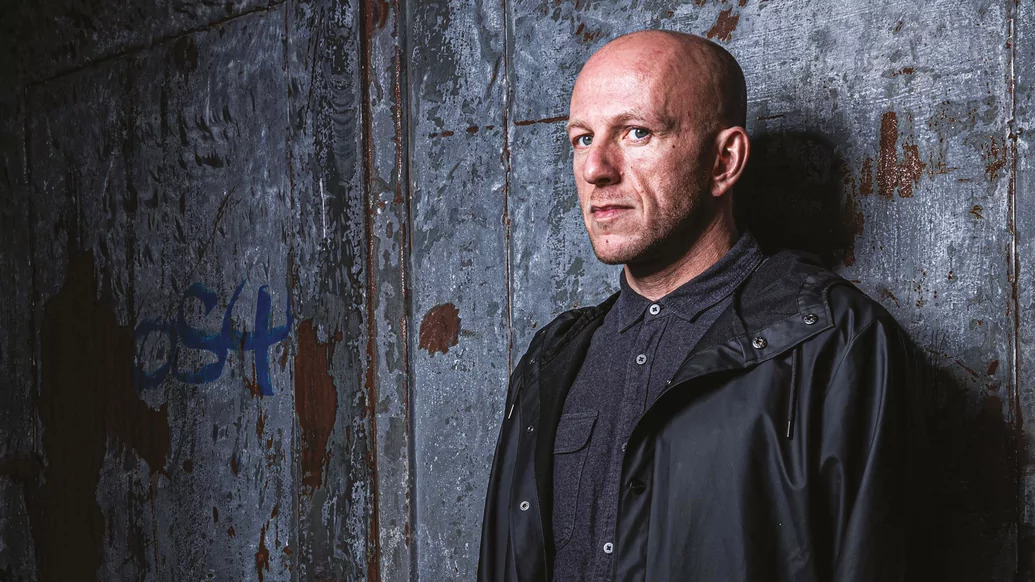

Love Under Pressure
S.O.S. is a response to the continuing impact of commerce on the techno scene, as well as a reaction to larger cultural developments like camera phones and social media. Launched in October of this year with a day of free-to-attend conference sessions and panels in Amsterdam, S.O.S arose from frustration at an industry that seemed to have lost sight of its roots.
“S.O.S was really borne out of the fact that all the people that were asking me to speak at their events were industry, and their topics were completely generic and industry-only focused: social media, marketing, management, and I was unhappy with the topics. And you either sit around complaining, or you do something about it.”
Subjects covered in the initial S.O.S included scene ethics and guidelines, space for marginalized communities, the artistic voice, no-camera policies, and global drug policy: focusing on the social, artistic, and creative side of techno culture as opposed to how best to maximize your marketing reach or increase your social media likes. “Right now, all these artist talks at events are always about how to market yourself, about using social media, about business in art, and we’re trying to bring the focus back to the art in art.”
Khutoretsky is now 43 years old and has spent more than half his life deep in dance music. He discovered the joys of rave at 16, frequenting Minneapolis’ infamous First Avenue club (where Prince filmed the video for ‘Purple Rain’, fact fans), plunging headlong into the hedonism and excitement of the early ’90s rave and club scene and the joys of house and techno. A good childhood and background had produced a generally happy if somewhat wayward teenager — “just a good kid doing bad things” is how he describes it — but Khutoretsky eventually ended up incarcerated for selling LSD.
A year spent locked up with 30 guys, playing dominos and cards while counting down the days acted as a spur, and looking back he’s clear on the effect it had on his life’s direction. Although far from the main driver in his future success, Khutoretsky’s prison spell was “absolutely a huge part of my motive afterwards to be focused and to take seriously my passions — and not take for granted just the everyday freedom of walking down the street.”
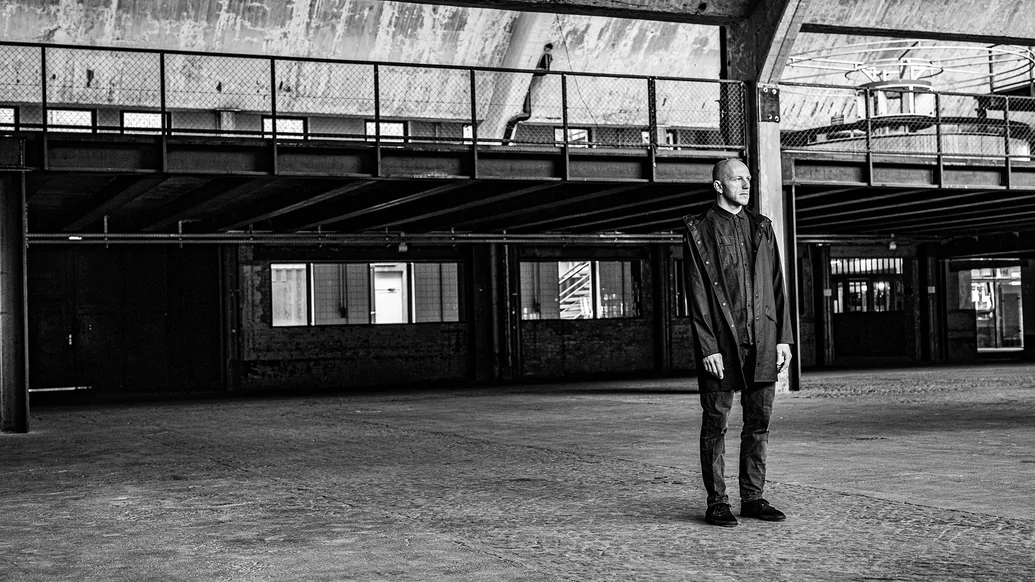
“It used to be a very secretive underground niche scene. It felt like a family. We had pager numbers to call to get the next set of directions to the rave, you had community shops that evolved around the culture, clothes, records"
The mid-west rave scene ignited young Khutoretsky’s obsession with sound, beginning a relationship with audio that continued through his entire working life, and that resulted in his infamous Wall Of Sound parties, which sidelined the modern spectacle of the DJ in favour of sheer sonic pressure. And, obviously, our hyper-futuristic setting here in one of the world’s most advanced spatial soundsystems also is testament to a lifelong love affair with sound.
“With clubs, I’ve said this a hundred times before, I was influenced by the most amazing soundsystems in the Midwest — like full physical objects — where the sound was the star. To experience music on that level is like taking drugs for the first time, you chase the dragon, and I always chase that experience now.”
Flight To Nowhere
The DVS1 story is far from a tale of overnight success. Once out from prison, Khutoretsky continued his love affair with raves and parties, DJing and eventually running his own club FOUNDATION in Minneapolis, before having to shut it down with personal losses of around $120,000. The Khutoretsky we see before us today: confident, focused, and completely locked into the idea of DJing as art form, is the result of more than a couple of decades of powering through the industry, seeing it from all angles, as a clubber, promoter, sound engineer, DJ, club owner, learning his trade. Energy and drive seem to be his defining features. Certainly, if our questions and his late night are tiring him, there’s no outside sign; indeed, Khutoretsky seems to be just getting warmed up. Lacking an ashtray, he fastidiously puts out his second cigarette on a small folded piece of card, not one flake of ash reaching the concrete floor, and launches into his next response.
“I started DJing when I was 16, but I only made it to the successful level of touring and earning my living when I was 33. And I never set out to do that. You should do this for a long time with no intention of making it, of being somebody... I get messages from kids and they want to know how to do what I do, how to make it to that level, and my answer is, 'Take that out of your mind, don’t do it for that, don’t start putting out tracks to have people appreciate them and don’t start DJing to get likes,” and to emphasize the next six words, he accompanies each one with a slap of his thigh — “do it because you love it.”
Following the closure of FOUNDATION, Khutoretsky took a sound engineering role in Detroit in January 2009, which was where the next stage of his career began. Although Ben Klock was the first to release DVS1’s music (the three slick, precise, understated tracks of the ‘Klockworks 05’ EP), it was actually Derrick May who first agreed to put his tracks out.
“I was working on creating a live set, the second one I had ever done after my club closed. I was taking any and all jobs I could at the time financially, and was headed to Detroit to do audio work at the yearly car show that happens. I was in Detroit for nearly a month. While there, Derrick and I would connect and go to Transmat and just listen to music. As we sat there talking and throwing tracks to each other to listen to, I snuck in a few of the things I was working on. When he heard a few of these, he told me he wanted to re-start Transmat after the long hiatus it was on, and wanted me to release on the label. Unfortunately Derrick took a while to re-activate the label and it just so happened that Ben Klock heard the tracks in my live set a few months later. He asked me if I wanted to release as well, and the rest is history...”

Khutoretsky’s lengthy career and slow rise to success has given him a clear perspective on the changing nature of clubs, raves, and DJing, as well as instilling in him the importance of this idea of apprenticeship, of putting in time and effort to achieve things, an ethos very much at odds with our current attention-deficit, instant-gratification, online culture. The digital revolution in music has had many consequences, some good, some bad, but one obvious trend has been increased access — to music, to clubs, to DJs — and the nature of this digital-facilitated access is instantaneous. During the last couple of decades, we’ve also seen house and techno music go avowedly overground, and that familiar four-four pulse has become ubiquitous. Now there’s no need for searching or exploring for club-nights, radio shows, new music, it’s all freely and instantaneously available, right now, in higher quantities than you could ever need. We’re spoilt for choice, and this has clearly affected the nature of club culture.
“For us, it used to be a very secretive underground niche scene. It felt like a family. We had pager numbers to call to get the next set of directions to the rave, you had community shops that evolved around the culture, clothes, records. But it wasn’t instantaneous, it wasn’t just there for you to passively consume, you had to search for it. And in searching for it, you had to put in effort, and in putting in effort, the pay-off was amazing. I’m not saying new young clubbers don’t appreciate it, and I don’t want to undervalue their experience, it's just different now and fair enough, different doesn’t necessarily mean good or bad, it just means things are different. But in valuing the way people find it, I still believe in my bones that there’s something special to seeking it out, putting some effort in to find it.”
Searching, Floating, Running
Khutoretsky is a realist and pragmatist, while simultaneously holding onto plenty of youthful idealism and faith in the simple power of a soundsystem, a bunch of people, and a kick-drum. S.O.S isn’t about railing against change, or looking to the past. It’s an evaluation of the past two decades where we’ve seen a digital revolution in music, in tandem with the increasing commercialization of dance music and DJ culture; and it’s the beginnings of a plan to protect the culture and think about our collective future.
If there is a sense that something has been lost during these last few years, then it’s something intangible and hard to define — it’s how you feel when you invest your time and effort into seeking out the very best of something, the thing that really speaks to you, and this authenticity is very much where S.O.S is focused. But our instant-access digital culture has more obvious effects too, not least of which is the fact that current software and hardware have made ‘being’ a DJ extremely easy, another related topic that Khutoretsky has strong opinions about.
“Everyone can do it and it’s everywhere. You know, everyone can go online and download the quickest DJ software now, everyone can press sync, techno is played in every clothing store and every elevator and taxi cab.” The dropping of barriers to DJing has allowed many who otherwise wouldn’t be able to do it, which can be viewed as a positive or a negative, depending on your opinion — but it has inevitably devalued the craft while contributing to an exponential growth in DJs.


“DJ technology is amazing; there's so many options, so many possibilities, but what’s shit about it is that everyone’s using the presets. It's like going to a studio, buying an amazing keyboard and never getting past the presets or going deeper into it... people talk a lot about my record collection and my vinyl purism, but I’m not against technology and actually this year I went almost all CDJ to all my gigs... but if I’m gonna use technology, I’m going to push my boundaries in technology, I’m going to use multiple decks, effects, and everything I can to push myself to my limits and go past them sometimes."
This elevation of DJing to an art form is key to understanding Khutoretsky’s position on that other contentious DJ-talking point: cameras in clubs and raves. He’s spoken in the past about Berghain’s ban on filming, his personal preference for a No-Phones dancefloor, and about how to translate the values of tolerance and diversity into actual real-world strategies or guidelines, including what we might call ‘phones-in-clubs etiquette.’ There are of course those in clubland who feel the current critique of cameras in clubs is patronising and overly serious in a scene that’s supposed to be fun. After all, techno isn’t your dad. But perhaps the issue of cameras becomes more acute in the more purist areas of dance music, where self-expression might take many forms and where freedom is directly related to assured anonymity and safety.
In this context, the reasons camera phones have caused such consternation in techno culture is not difficult to understand. Techno generates energy at the point of contact; its power lies in its ability to create community in the moment — a techno record has no influence when it’s sitting on the shelf, waiting to be played, it can only work its magic when it’s activated in real time. By attempting to capture and document something that by its very nature is in the here-and-now, we limit it, put a frame round it, attempt to freeze in time something that can only exist in the present, because techno’s true power to lift and unite exists in the now.
The scene is at its best when the entire room is active, participating and locked into the moment. Phones, cameras, and the social media they’re linked to, can draw people away from those communal moments, reasserting the ego’s wish to document, record, and share. If enough people are on their phones it can genuinely kill the vibe. And how can a club be a site of freedom and expression if people are self-conscious about being filmed or photographed?
It’s notable that Khutoretsky doesn’t see the current phones-in-clubs discourse as a ‘kids these days’ generational critique. We are all subject to the enticing warm glow of our phones, and the inviting call-to-narcissism offered by the various social media platforms; very few of us are immune to their charms, even as we observe the damage they wreak.
“In the last 20 years, we were handed technology like phones, and never told what to do with it, and I’ve seen many 40+year-olds abuse their phones and social media — it has nothing to do with age, it has to do with the fact that they don’t have any thought about how all these things are interconnected... I almost give more credence to the young generation than the old ones because I think the old guys should know better, the young people have grown up with it, but the reality is that we’re all insecure human beings and we’ve all been handed something that magnifies everything we do and are — our insecurities, our positives, our negatives.”

“Everyone can go online and download the quickest DJ software now, everyone can press sync, techno is played in every clothing store and every elevator and taxi cab”
Beyond the cameras, there’s also the social media that the photos get uploaded to, and the narcissism, competition and fakery that Instagram, Twitter, and Facebook encourage us to participate in, which again, feels somewhat at odds to underground dance music culture. “Social media has twisted people’s perception, their motivations, and it has just skewed a lot of things.” But Zak feels there’s another more insidious effect that camera phone culture is having on the music itself.
“People are literally making and performing music unconsciously to create moments for the fucking camera now, because it’s really obvious when you go hear a set and you start to hear this epic breakdown every couple of tracks and you hear the snare roll — you know it’s a ‘moment’ and people throw their cameras up and they’re ready to capture it and it becomes this thing of having moments. This is why I love ‘adventure’ DJ sets, loopy techno stuff, because there is no obvious moment, when it happens, it just happens.”
Of course the converse of this is that ‘Insta culture’ is also clearly driving some DJs and producers — including Khutoretsky himself — to be more resolutely underground, to avoid those obvious techniques and worn-out tropes in their sets and productions, and to seek and practice integrity and authenticity in their art.
Falling, Departure, Arrival
It’s the push and pull between art and commerce, together with Khutoretsky’s experiences of the potential that a soundsystem, a dark room, and a bunch of like-minded people contains, that has driven the creation of S.O.S. As he talks more about it, there seems to be an unspoken admission that underpinning the whole endeavor is the idea that there is a ‘rave ethos,’ which is in large part defined by the specific roots of house and techno in the often-dispossessed African-American, Latino, and LGBT communities in US cities. The scenes that grew from these roots have always been defined by tolerance, inclusion, and diversity.
In tandem with this is the belief that there is the potential to change lives for the better simply through the ancient human practice of getting together and dancing to the beat of the drum. That when we get together in a dark room and dance to contemporary, futuristic dance music, we’re actually engaging with an ancient tradition, one that can render positive results for individuals and society, and is therefore worthy of protection.
S.O.S doesn’t feel like it’s a crusade, or intend to ‘call out’ or attack individuals. Indeed, to those at the top of the dance music tree, making a living out of pressing play to synced pyrotechnics, Khutoretsky simply says, “More power to them. You have to have contrast, you have to have them to have us, black to have white, I’m totally ok with that, I just hate that we’re all in the grey right now.”
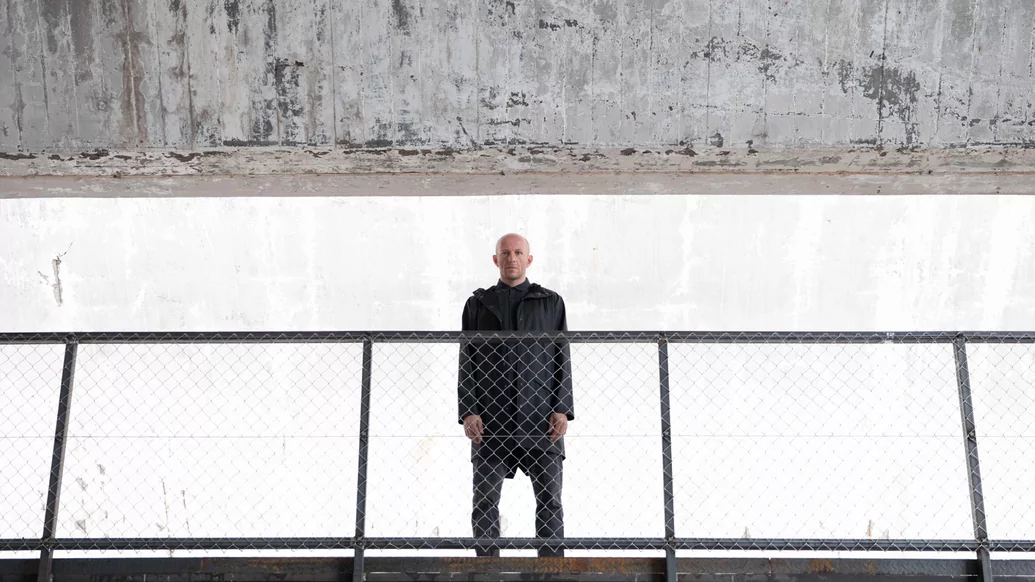

Neither is S.O.S a backwards-looking initiative, and Khutoretsky is under no illusions about the reality of change. “We are an industry now and there’s no going back to being a global scene — because in the ’90s when this scene was less ‘everywhere,’ it was a global scene in that you could travel to London, go to the record store, find a flyer, go to that party and feel like you were part of the scene. There were a couple of parties, now there’s 80 a weekend in London, and bars with DJs and clubs that have this and this... and there’s more people eating from it. It’s a machine. And I get it, there’s no going back.”
But just like so many of us, Zak Khutoretsky’s life has been defined and enriched by dance music, by techno. S.O.S is “...my way of giving back — it’s organising something, putting my money back into it, gathering a good team of people and trying to connect a community I believe in. It’s using my position for something positive... to get people to think a little bit deeper about where their money goes, about who they support, their morals and values, their respect of people’s privacy of the no-photo thing and of cultural guidelines when you step into this community.”
The concerns of S.O.S mirror the concerns of many clubbers and DJs, young and old, and are clearly related to Khutoretsky’s particular story: the journey of discovery of rave culture, DJing and techno, at a time when the journey was largely undocumented and when dance music was way less prevalent and accessible than today. S.O.S is also closely tied to a certain idea of what DJing can be: more than just entertainment, more than the backdrop to a night of excess, but an art form, a creative event, a powerful rite. Certainly the word ‘art’ crops up several times in the course of our conversation. “I’m not an entertainer — I mean, I hate calling myself an artist, but I want to be an artist... I know what I do, I entertain — but I want to be free in my art.”
Quite what S.O.S will develop into remains to be seen, but the broad range of topics at the initial event demonstrates a commitment to protecting club/DJ culture but also looking to the future and addressing concrete, real world issues. Khutoretsky is keen for the initiative to feature a broad range of voices, not all necessarily representing his views, but the general focus is clear: It’s navigating that tension between commerce and culture, between money and art. As we wrap up after more than an hour’s talk, he’s upbeat and positive about his latest endeavor, even as he expresses his frustration.
“It’s a culturally repetitive thing, it’s happened in every revolution in music, art, food, everything. Scenes start because of a lack of something, a need for something. Then once they get established and do well, money sees it, finds it, usually destroys it, or at least warps it. I actually thought we would implode five years ago but nothing’s changing, and now we’re stuck in a loop of only talking about our scene on a business level, on a global level.” Words momentarily fail him and he signifies the various demons of encroaching commerce with an effusive wave of his hands.
“We’re at this crossing point, this bigger influence is destroying us and S.O.S is a much needed alternative voice, an alternative influence to remind a new generation and even an old generation too that instead of only seeing the one option in front of us — the industry talk — to be reminded that no, there is an alternative, that there are other options, other perspectives, there are other voices.”
